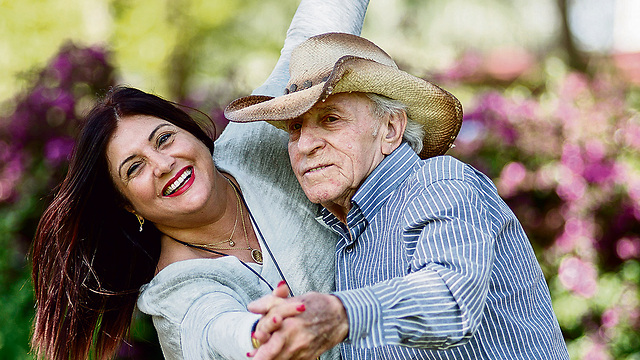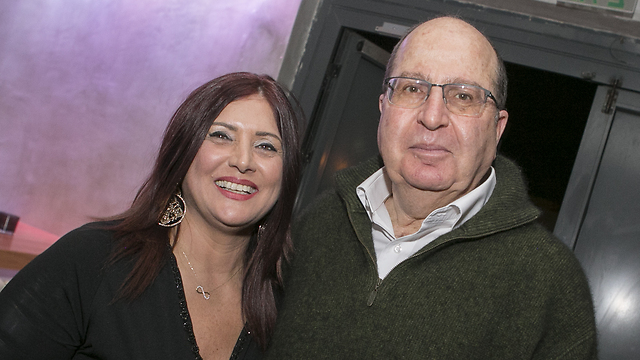
Heart of gold: The woman who makes Holocaust survivors' dreams come true
For years, Ronit Lev was afraid of dealing with the Holocaust. But a visit to the extermination camps in Poland opened her eyes, and she has since dedicated her life since to fulfilling wishes of Holocaust survivors. 'All they want is a little bit of happiness and attention,' she says.
Dov Yaakobovitz, a Holocaust survivor who survived Auschwitz, has always loved to dance. With his leather cowboy boots and captivating smile, it's not hard to envision the charming young man he once was, the one who was the life of every party. But 12 years ago, when his partner fell ill with cancer, Yaakobovitz stopped dancing. Upon her death, he was left utterly lonely. His joie de vivre was gone.
At the age of 89, it's not that easy for Yaakobovitz to go dancing anymore with his backaches, hearing problems and ongoing lack of a partner. But the yearning to dance has never left Yaakobovitz.
So when he met Ronit Lev, who volunteers to make Holocaust survivors' dreams come true, he only had one request. They've been meeting for two years now to dance together.
"My dream," he calls her, twirling her around, and they both launch into dance to the song, Let's Return to the Tango. And so Yaakobovitz returns. With one step forward and two steps to the side, he returns to the days when he was young and handsome and went dancing at night clubs in Tel Aviv, Berlin and Johannesburg.
"Generally, I'm satisfied with my life today," he says, "but it's only when I'm dancing with Ronit that I truly feel happy."
One big heart
It’s not hard to pick Ronit Lev out of a crowd. A necklace with a massive gold heart the same size as the one beating in her chest adorns her neck.
Lev, whose last name actually means "heart" in Hebrew, served as an officer in the IDF and was released at the rank of colonel. After her released from the army, she worked as a personal aide to then-Defense Minister Moshe Ya'alon.
But over the past two years, she has been making use of her skills and many connections to dedicate every waking moment to helping Holocaust survivors. With her Facebook page "Realizing small dreams for grand people," she tries to bring some joy into the lives of those who survived the most horrendous of terrors.
Her Facebook page serves as a sort of matchmaker between Holocaust survivors and everyday people who want and are able to make the survivors' dreams come true. As the page's name indicates, these are not very big dreams, but rather modest requests that only require a bit of goodwill in order to be fulfilled.
Lev gives an example of a wheelchair-bound Holocaust survivor from Jerusalem whose wish was to spend a few hours sitting by the sea. She helped him find a Jerusalem resident who could drive him with his wheelchair to the beach.
Several days ago, she met a Holocaust survivor whose "big" dream was to learn how to use a computer. Lev quickly paired her up with a teacher who comes to her house in Holon to give her private lessons for free.
Another survivor asked to have her massive collection of photos organized and catalogued, and Lev found her a professional to do just that.
"These are the people who were able to endure this horrible experience," says Lev, "and now all they're looking for is a bit of attention—a bit of happiness. What's really important to me is not just to make their small dream come true: It's about introducing them to someone who could help, talk to them, and spend some time with them. My dream is for the connection between survivors and their helpers to continue."
For years, Lev had been averse to anything related to the Holocaust. "I remember that it was always difficult for me on Holocaust Remembrance Day," she recounts. "I couldn't deal with this thing. I'd stop watching movies (about the Holocaust) halfway through. I couldn't bear it."
That aversion continued throughout her long military career. But then, shortly before her discharge, she was given an opportunity to lead a delegation of IDF officers on a trip to the extermination camps in Poland. It was then that Lev realized she had to face her greatest fear.
"In my last job in the army, I was the head of the Organization and Human Resources Department in the Manpower Directorate," she says. "At my position and rank, officers who go on a trip to Poland serve as team leaders. They're in charge of a group of 55 junior officers, career soldiers and conscripted soldiers.
"For years, I was afraid I wouldn't be able to deal with the sights and wouldn't be able to set a personal example to the people I was leading. But my release was drawing near, and I told myself, 'Ronit, you're a big girl. It doesn't make sense for you to run away from something.'"
Leading the delegation wasn't easy. "It was very hard on me. I was constantly in tears," she says. But it was those tears that opened her eyes. "When I came back from the trip, I told myself it would not end here. I decided that I was going to connect to as much as possible to the very thing I was so afraid of."
After she returned from Poland, Lev became a project manager in the Manpower Directorate, leading activities to do with Holocaust survivors. She organized lectures and meetings, conferences and seminars, and mostly connected paired Holocaust survivors with IDF units, who warmly embraced the survivors. Even after her release from the IDF, she continued doing God’s work.
As part of her volunteer work, Lev has encountered hundreds of survivors and quickly realized how much was lacking in their lives, but at the same time, she also realized how easily she could provide them with what they need. "I wanted to make these people's dreams come true. After all, they don't have many years left, and this is the time to do this," she says.
One of the more moving dreams she helped realize was that of a survivor named Tovah, who walked up to Lev after a public talk.
"She said her dream was to kiss the hands of the man who had led the Israel Air Force flyover of Auschwitz," Lev remembers. "She said that that pilot had guts, like her. During the Holocaust, she said she escaped at every opportunity she had to get food.
“The pilot had guts, just like her, when he led the military flyover in Poland. I recorded her on my phone and immediately sent it to the flyover's commander, IAF Commander Amir Eshel. Within a week, we set up a meeting between them. He was embarrassed but he let her kiss his hands. She was so moved that she sat there and cried."
Dancing with death
The dancer Yaakobovitz was one of the first people Lev met when she returned from Poland. Looking at him today, it's hard to imagine the horrors he endured during the Holocaust. Yaakobovitz was transferred between four camps, passing himself off as taller than he was in his attempts to survive. He was dancing with death.
Yaakobovitz was born in Transylvania in 1928, one of seven siblings, and he was 14 when the war broke out. After Romania allied with the Nazis, the family was sent to a ghetto, where the resourceful Yaakobovitz crawled under the walls to search for food for the family. Once, his older brother accompanied him to look for food, but he was caught and summarily executed.
Later, the entire family was sent to Auschwitz. "We walked under the 'Work sets you free' sign and were sent straight to Dr. Mengele," he recounts. "One of the Poles who was standing in line with us told me in Yiddish, 'Stay away from your mother,' so I stood to the side a bit.
"My mom, who was with three of my sisters, was sent to the left (to immediate death). Mengele hit my hand with a stick and then sent me to the right. That was the last time I saw my mother. What's left of her now is only garbage and smoke. This is something that has been haunting me for 70 years."
Yaakobovitz was able to escape Auschwitz's crematoria but was sent to the nearby Birkenau camp instead, and then to Buchenwald and later to Theresienstadt. Every time the Nazis were looking for workers, he infiltrated the rows of men and stood on his tiptoes to appear taller and older than he was.
After the war, Yaakobovitz returned home to learn only two of his sisters had survived the Holocaust. In 1947, he followed one of his sisters and immigrated Israel, where he enlisted in the IDF's Golani Brigade and fought in the War of Independence and in the 1956 Sinai Campaign.
After his release from the army, he got a bus driver's license and drove the entertainment stars of the day to their performances throughout the country. With the same cowboy boots he has today, he drove Yafa Yarkoni, Chaim Topol and Shaike Ophir, worked with film producer Avraham Deshe and was a close friend of comedy trio HaGashash HaHiver.
In the early 1960s, he drove Frank Sinatra during his visit to Israel, and when Sophia Loren came to Israel to film the movie Judith in 1964, he even tried to flirt with her.
But near the end of the 1960s, Yaakobovitz felt overwhelmed. "After everything I've been through, I needed some air," he says, explaining why he decided to take a few years to travel the world. "I went from one country to the next and lived like a gypsy. During that time, I went to night clubs all the time. Everywhere in the world I ended up—South Africa, the United States, even Germany—I always looked for where I could go dancing."
He stopped dancing 12 years ago, and he now lives at a nursing home in the Tel Aviv neighborhood of Hatikva.
"When I met Dov, and he asked me to dance with him, everyone thought I'd be too embarrassed," Lev says. "But I told myself, 'If this is what would make this dear man happy, that is what I'll do.'"
Asked if she felt it was her responsible try to fix the deplorable situation in which many Holocaust survivors live, she replied, "It's important to note that not all Holocaust survivors are needy, but there are definitely many that are, and that's very painful to think about.
"My project is not meant to save them of this disgrace, but to make their dreams come true. I want to take care of their more basic needs too, but I can see they long for something else as well, and that is something I can give them without effort. My contribution seeks to give them a little smile, a little bit of happiness. There are those who would say giving is something very egotistical, and they would be right. When I make someone's dream come true, I'm the one who walks around with a smile all over my face for a few days later."
(Translated and edited by Yaara Shalom)












